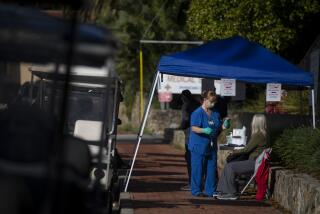HEALTH CARE : Federal Reforms Put Future of Louisiana Hospital in Doubt
- Share via
NEW ORLEANS — Past midnight in the crowded emergency room lobby of historic Charity Hospital, Marie Johnson is standing near a sign warning that guns, knives and other weapons are not allowed on the property.
“This is the only place I could go,” said Johnson, 36, who works as a maid in a local hotel and makes less than $15,000 a year. “We don’t have any money, and if you don’t have money you don’t have insurance. Charity is the only place left.”
Johnson had come to the hospital with her mother, who was experiencing dizziness. If any medical attention is necessary beyond a brief examination, Charity will provide it.
Johnson’s mother needed only a prescription. But others arriving that night at the hospital--constructed when Huey Long, Louisiana’s populist governor and senator of the 1930s, was in power--were not as lucky. Some had gunshot or stab wounds. One man said he was HIV-positive and was coughing up blood. None would be turned away.
“This is an extraordinary place when you think about it,” said John Salvaggio, vice chancellor for research at the nearby Tulane University Medical Center. “A hospital that is truly open to anyone and has been for decades now, long before all this talk about the Clinton health care plan.”
But it is because of the push in Washington to pass some sort of health reform that many here are wondering about Charity’s future, particularly given its ongoing funding problems.
“There is a lot of confusion right now,” said Democratic state House Speaker John Alario. “Everyone knows that Charity needs money and upgraded facilities, but no one wants to do anything until they see what’s going to happen with Clinton’s program.”
State health department figures illustrate Charity’s importance: More than 25% of Louisianians are currently without health insurance, compared to 17% nationally, and up to 500,000 people a year are admitted to Charity.
“This is an extremely important institution to this state and will continue to be so despite its problems,” said Arnold Lupin, a New Orleans physician who heads the Louisiana Health Care Authority, which operates Charity. “We’ve had funding and accreditation problems in the past, that’s true, but we’re working to correct those.”
Not only does Charity treat almost exclusively the fastest-growing segment of the state’s population--the unemployed or underemployed living in poverty--it has done so in a building so in need of structural repairs that one estimate said it could cost as much as $270 million to bring the hospital up to minimal standards.
And Charity frequently has suffered from the prevailing political winds.
In a state where politics oftentimes is everything, populist leaders like Long and current Gov. Edwin W. Edwards have supported lavish programs for the hospital, while the more conservative reform governors and the Louisiana Legislature usually cut such spending. Last year, lawmakers stripped the hospital of more than $10 million.
Charity also frequently has come out on the losing side in its quest to retain its accreditation, an industry seal of approval that hospitals need if they expect to receive federal Medicaid and Medicare funding. Because of the deteriorating state of the building and the elusive funding necessary to maintain it, Charity has lost its accreditation four times since the 1970s.
But Lupin is optimistic about the hospital’s future. “This is the last time we’re going to have a problem with accreditation,” he said of the decision several weeks ago by the Joint Commission on Accreditation of Healthcare Organizations to accredit Charity for another three years, as long as the hospital makes at least $1.1 million in immediate improvements.
Lupin said he is particularly hopeful about Charity’s prospects in the wake of a decision by Edwards to purchase a newer hospital for Charity’s use.
Charity “has always served those no one else would take in,” Salvaggio said, stressing that the proposed upgrades won’t matter unless the hospital’s mission is maintained.
More to Read
Sign up for Essential California
The most important California stories and recommendations in your inbox every morning.
You may occasionally receive promotional content from the Los Angeles Times.













